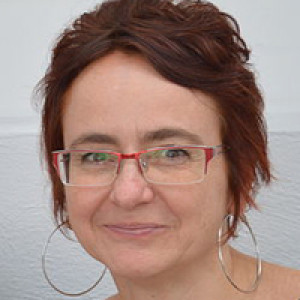
26K
Downloads
304
Episodes
The Chills at Will Podcast is a celebration of the visceral beauty of literature. This beauty will be examined through close reads of phrases and lines and passages from fiction and nonfiction that thrills the reader, so much so that he wants to read again and again to replicate that thrill. Each episode will focus on a different theme, such as "The Power of Flashback," "Understatement," "Cats in the Cradle," and "Chills at Will: Origin Story."
Episodes

Friday Mar 12, 2021
Friday Mar 12, 2021
Show Notes and Links to Rowena Galavitz’s Work and Allusions/Texts from Episode 46
On Episode 46, Pete talks with Rowena Galavitz about her varied and engrossing interests, including literature and arts of many kinds. The two delve deep into Rowena’s vocation as an editor and translator, as Rowena shares some of her translations, as well as her process for doing said translation.
Rowena Galavitz worked as a typesetter/proofreader in New York City in the 80s, when she created art books for museums such as the Metropolitan Museum of Art and educational books for publishers such as Scholastic and while she enjoyed the art and punk rock scene of the city. When she moved to Oaxaca, Mexico, she edited, translated, or oversaw the production of coffee table art books and art catalogues about Mexican art. In Mexico City, she worked as a subtitle editor doing closed captioning for films and TV series. In the literary world, her experience includes the translation of Latin American short stories and poetry. Some of her poetry translation won a World Literature Today Prize in 2018. In her current editing and translation work, she focuses broadly on the arts and humanities and specifically on contemporary Mexican and early modern Spanish culture.
Enthusiastic and knowledgeable about literary and religious texts in the early modern world, her scholarly pursuits about women writing in Spanish have entailed archival research in Mexico and Spain, which resulted in a master’s thesis on Hipólita de Jesús (1551-1624), a Barcelona nun who wrote over twenty books. Her archival research in Peru manifested in multiple presentations on a collage by Rosa de Lima (1586-1617), about which she is currently writing a journal article. Her theoretical interests include gender and sexuality, intersectional feminism, and translation theory.
She has taught classes at the university level in English as a Second Language, English composition, and Intermediate Spanish. And she has developed syllabi on courses such as: Women Who Wrote: Literature and Religion in the Premodern World, The Long History of the End of the World, and Radical Women. She loves to teach students about how language and literature work, and she is particularly at ease when she teaches about a wide range of texts on a single theme from different historical periods.
Parallel to her editorial and educational work, she created literature-inspired art in a variety of media for three decades, mostly in Mexico, where she held five one-woman exhibits, and she participated in over 60 group shows.
At around 4:55, Rowena talks about growing up in a small town, and her grandparents’ influence on her, as they were big patrons of the library; Rowena also talks about the artistic sensibility that has been with her from an early age
At around 6:20, Rowena talks about how her Spanish learning and interest blossomed
At around 8:30, Rowena talks about her days living, researching, translating, learning, and creating in Oaxaca and México City
At around 11:30, Rowena talks about writers who have thrilled her through the years, including Richard Wright and his Native Son, A Journal of The Plague Year by Daniel DeFoe, Valeria Luiselli’s Tell Me How it Ends, Merce Redoreda's Mirall Trencat, and Manuel Astur’s San, El Libro de los Milagros.
At around 14:40, Rowena talks about her schedule as a translator/editor
At around 16:05, Rowena talks about the process, art, and science of translating and the “decisions” she makes
At around 22:15, Rowena talks about how she researches and uses historical context in her translation, including things that may not match up with 2021’s societal norms
At around 26:30, Rowena talks about balancing the different forms of spoken Spanish as she does her translations
At around 29:00, Rowena talks about some of her favorite genres to work with in translation
At around 31:00, Rowena talks about how she reads other translator’s work and working with closed captioning and subtitles
At around 33:10, Rowena talks about the Catalan language and her learning of the language
At around 35:00, Pete and Rowena read an excerpt of the English and Spanish translation done by Rowena of “La Ciudad Lucía” by Paula Ilabaca Nuñez, also discussing Rowena’s thought process in doing the translation as she highlights alliteration, enjambments, etc.
At around 41:15, Rowena talks about her future projects, including translating some work by the great Sor Juana Inés de la Cruz and Elena Poniatowska and Javier Sicilia
At around 43:00, Pete and Rowena talks about the subtleties of “tú” and “Ud.” and its peculiarities in translation as seen in the great story by Juan Rulfo, “No Oyes Ladrar los Perros”-check out Pete’s earlier episode about this story
You can now subscribe to the podcast on Apple Podcasts, and leave me a five-star review. You can also ask for the podcast by name using Alexa, and find the pod on Spotify and on Amazon Music. Follow me on IG, where I’m @chillsatwillpodcast, or on Twitter, where I’m @chillsatwillpo1.
This is a passion project of mine, a DIY operation, and I’d love for your help in promoting what I’m convinced is a unique and spirited look at an often-ignored art form.
The intro song for The Chills at Will Podcast is “Wind Down” (Instrumental Version), and the other song played on this episode was “Hoops” (Instrumental)” by Matt Weidauer, and both songs are used through ArchesAudio.com.

No comments yet. Be the first to say something!